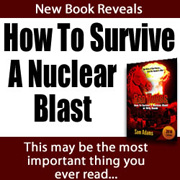 |
| Greenpeace team member holding a Geiger counter in Fukushima © AFP/GREENPEACE Christian Aslund |
WASHINGTON (AFP) – US experts have expressed uncertainty about the seriousness of the situation at Japan’s Fukushima nuclear complex, steering clear of speculation whether the core of one of the reactors there had been damaged.
Dave Lochbaum, director of the Nuclear Safety Project at the Union of Concerned Scientists, an independent advocacy group that has been a nuclear industry watchdog for 40 years, said there had been reports that the reactor vessel for Unit 3 at the power plant had been breached.
But he also noted that there was some data put out by the Japanese Nuclear and Industrial Safety Agency that the reactor vessel was still intact.
“So, it’s contradictory data,” Lochbaum told reporters Friday. “I think that’s reflective of the situation over there. There’s quite a bit of damage in quite a few areas. There’s not a lot of instrumentation available. There’s not a lot of access available for workers to go through the facility and more accurately assess conditions in lieu of the instrumentation that’s spotty at best.”
Lochbaum added that he thought it was going to take a while to fully identify what happened at Fukushima and why.
Two weeks after the 9.0-magnitude March 11 quake and subsequent tsunami seriously damaged the ageing nuclear plant in northeastern Japan, rescue work is still under way to avoid a major nuclear disaster.
Radiation levels have surged in the seawater in the area and there are concerns that fuel rod vessels or their valves and pipes are leaking.
More than 27,000 people are dead or missing after the quake and tsunami.
According Edwin Lyman, a physicist who works for the group, even the worst case scenario may not be as bad as it might appear.
If the reactor vessel is breached and the reactor core falls into the containment, Lyman noted, the uranium release would be on the order of one to 10 percent, and for plutonium and less volatile isotopes, it would probably be less than one percent.
 “So, if the vessel breaches and the containment failure is still delayed significantly, then you have more played out and less environmental release,” the scientist pointed out.
“So, if the vessel breaches and the containment failure is still delayed significantly, then you have more played out and less environmental release,” the scientist pointed out.
Ian Hutchison, professor of nuclear science at the Massachusetts Institute of Technology, said that radioactivity in the water around the plant was not necessarily surprising given the amount of water sprayed onto and pumped into the reactors.
“I am not particularly alarmed,” he noted on CNN television.
Steve Kerekes, senior director of communications for the Nuclear Energy Institute, said his organization did not have enough information about the situation with the Fukushima reactors to draw conclusions.
When asked what can be expected if the the reactor vessel is breached, he answered: “This is a speculative question, we have to wait and see.”
According to Adrian Heymer, senior director of strategic programs at the Nuclear Energy Institute, even in the worst case scenario, there should not be significant harm to the public.
“It should not have additional harm to the public,” he said. “The Japanese authorities are taking all the necessary measures.”
© AFP — Published at Activist Post with license
linkwithin_text=’Related Articles:’
Leave a comment
You must be logged in to post a comment.


Be the first to comment on "US experts unsure about Fukushima situation"